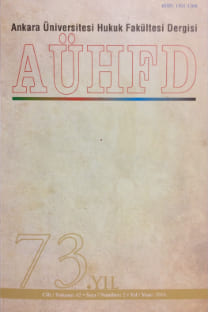BİR SUÇ İÇİN BİR CEZA VERİLİR İLKESİNİN İHLALİ: TCK md.142-4
Bileşik suç, hırsızlık, konut dokunulmazlığı, konut dokunulmazlığının ihlali, ne bis in idem
Violation of Ne BisIn Idem Principle: Turkish Penal Code Article 142-4
Complex offence, theft, dwelling immunity, violation of dwelling immunity, ne bis in idem,
- ISSN: 1301-1308
- Yayın Aralığı: 4
- Başlangıç: 1943
- Yayıncı: Ankara Üniversitesi Hukuk Fakültesi
KANUN TASARI VE TEKLİFLERİNİN TÜRKİYE BÜYÜK MİLLET MECLİSİNDE YENİDEN GÖRÜŞÜLMESİ: TEKRİR-İ MÜZAKERE
DIE DENATIONALISIERUNG DES PRIVATRECHTS IN EUROPA – EINE GRUNDLAGEN- UND URSACHENANALYSE
BİR SUÇ İÇİN BİR CEZA VERİLİR İLKESİNİN İHLALİ: TCK md.142-4
Metin FEYZİOĞLU, Devrim GÜNGÖR
ULUSLARARASI CEZA MAHKEMESİ ve TÜRKİYE
VERGİ ALACAĞININ TAHAKKUKU: BİR AŞAMA VE BİR İŞLEM
AVRUPA BİRLİĞİ’NDE KREDİ KURUMLARININ SINIR ÖTESİ ŞUBE AÇMALARI VE HİZMET SUNMALARI
A Conceptual Framework for the Constitutıonal Studies on the Basis of the Concept of Political Power
AVRUPA KONSEYİ ARABULUCULUK YÖNERGESİ ÖNERİSİ
